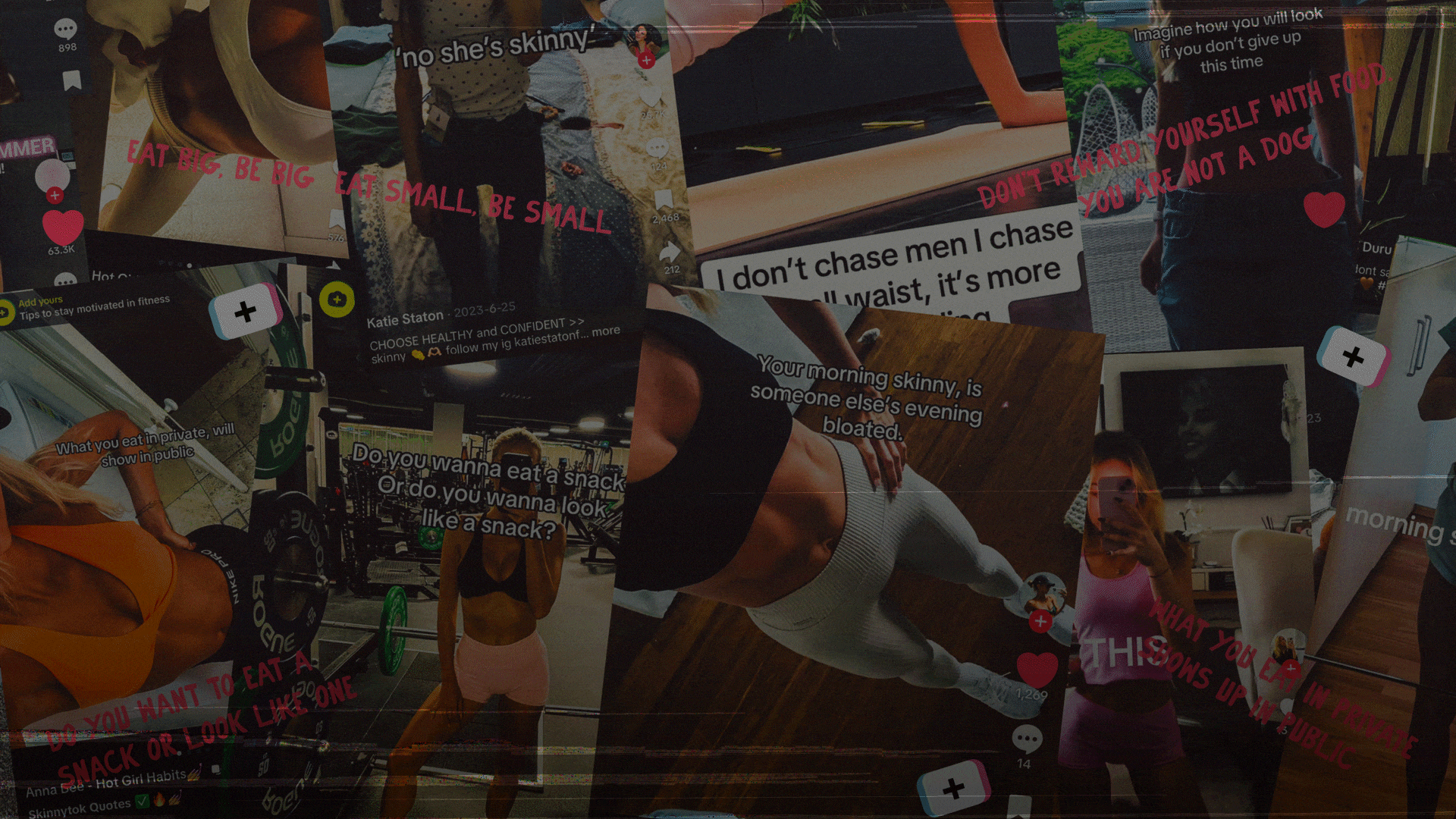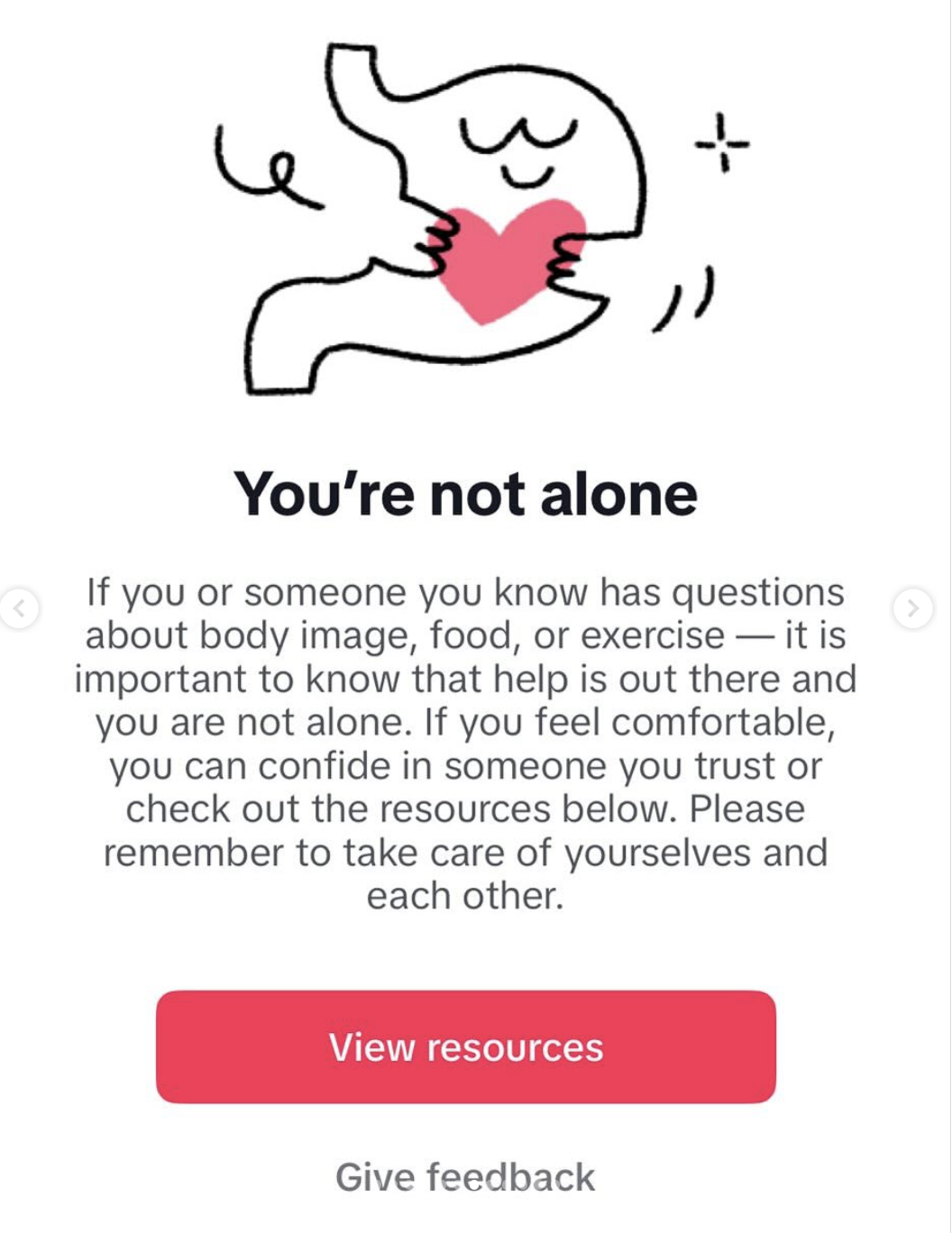TikTok Banned SkinnyTok, But ‘Skniytok’ Quickly Took Its Place
A hashtag ban can’t cure our culture’s addiction to thinness — just look at ‘Skniytok’


Yesterday, TikTok banned SkinnyTok — the internet immediately found a workaround.
A one word caption on influencer Liv Schmidt’s pinned post says it all — REBIRTH. It refers to the latest incarnation of her weight-loss community, The Skinni Société, a Millennial-pink–branded “mindset,” not movement. As the account’s bio insists:
“Skinni is a mindset
This isn’t a restriction. This is just taste.
Not Disordered. Just Disciplined
Structure. Not Starvation.”
It’s the kind of language that conveniently toes the line between self-improvement and self-erasure and it launched just one week before TikTok finally banned the hashtag SkinnyTok.
For the uninitiated (or un-algorithmed), SkinnyTok was a dark—though ironically pastel-coloured—corner of TikTok where aspirational thinness was a religion. Or, as critics put it: a cult. Here, users, typically young and predominantly female, uploaded calorie-counted meals, thigh-gap inspo, and body-check videos disguised as health and wellness content.
At the center of much of this skinny storm was, and still is, Liv Schmidt, who critics are calling the poster girl for a new era of Pro-Ana content. Prior to being banned from TikTok last year, Schmidt racked up millions of views by espousing the benefits of what many see as dangerously restrictive eating habits.
A “Skinny Girl Breakfast,” according to Schmidt’s Amazon Storefront—where she earns commission as one of the retail giant’s Top Creators—consists only of protein powders and electrolyte mixes: “My hunger-crushing combo that keeps you full all day long”. Just looking at this page of powdery sustenance makes me feel sad and empty, though not in the way Schmidt might hope.
Celebrity news, beauty, fashion advice, and fascinating features, delivered straight to your inbox!
As of today, a search for SkinnyTok will direct you to a wellness announcement instead of a slew of aestheticised starvation diaries. However, a search for Skniytok, which the platform suggested after I typed “sk” into the search bar, led me to a video captioned, “Give me toxic motivation and tips to loose [sic] weight.” That video prompted another search: I Drank This To Lose Weight. Going down the algorithmic rabbit hole, I landed on a page bursting at the metaphorical seams with #caloriedeficit content, “fat loss coffee,” “chia seed water”, etc, etc,.
Later, I was prompted to Shop for skniytok, which led me to a storefront of collagen gummies, Summer Fridays’ Lip Butter Balm (Schmidt is a vocal fan of the brand), and a smattering of K-beauty. The sheer volume of acne-related products suggests to me that the algorithm is catering to a teenage demographic, though the workings of TikTok’s recommendation engine remain closely guarded. A request for comment on the SkinnyTok ban went unanswered.
A third search for skniytok triggered a pop-up headlined “You are more than your weight.” When I clicked to read the rest of the PSA, I was directed to a blank page, which felt a little on the nose.

“I think the TikTok ban is partly good, as it serves as a symbol of solidarity and shows that they’re not standing with it,” says Chloe Laws, a TEDx speaker and founder of the feminist platform FGRLS CLUB. “But ultimately, I think it’s a little too late.” It would be easy to pin all of this on TikTok. Health experts and organisations like the National Eating Disorders Association had long warned that the surge in SkinnyTok content could harm viewers—especially younger ones—by glamourising disordered eating. TikTok didn’t invent these ideals; but it did amplifiy them.
The real issue, however, is societal and it’s bigger, more pervasive, and probably more profitable than ever. Just look at how quickly Ozempic hit the mainstream. Originally developed to manage diabetes, the injectable drug and its cousin, Wegovy (which you can now buy in Superdrug) has become an unsaid status symbol. #Ozempic has over a billion views on TikTok and unlike cigarettes or diet pills, Ozempic has entered the wellness arena with medical legitimacy, making it far harder to challenge.
For those of us who grew up in the Nineties and Noughties, it all feels eerily familiar. One of the ‘games’ girls used to play in my secondary school was seeing who could squeeze through the narrowest gaps between tables. It was kind of like a reverse limbo and I remember drawing in deep breaths trying to contract my ribcage to squeeze through the cavity. In P.E., our year’s skinniest girl (who inexplicably also had D-cup boobs and was therefore the envy of quite literally, everyone), would hoist up her Aertex polo shirt so everyone could admire her concave tummy as she stretched out on the mat. Girls would trade ‘tips’, many of which are still circulating today on TikTok, Instagram and The Skinni Société, such as drinking a pint of water before, during, and after each meal. For an all-too-brief moment in the 2010s, it felt like these damaging ideas and body ideals had finally fallen out of favour, but they never really went away.
The only discernible difference I can tell between the 90s and 00s diet culture and now is branding. Today’s obsession with thinness is wrapped in the language of “wellness.” Skinni Société might not promote smoking to suppress appetite but the goal is still the same: be skinny.
Ultimately, TikTok should have acted long before SkinnyTok became a trend. By allowing it to proliferate unchecked, the platform helped promote dangerous body standards and legitimise a culture of extreme weight loss. A ban now, while welcome, can’t undo the damage already done to the countless number of users who have internalised those ideals. “It is their responsibility to ban content like that and to not create such a space for it to thrive like they have been,” adds Laws.
TikTok didn’t invent SkinnyTok. But by letting it grow unchecked, they helped feed it.

Mischa Anouk Smith is the News and Features Editor of Marie Claire UK.
From personal essays to purpose-driven stories, reported studies, and interviews with celebrities like Rosie Huntington-Whiteley and designers including Dries Van Noten, Mischa has been featured in publications such as Refinery29, Stylist and Dazed. Her work explores what it means to be a woman today and sits at the intersection of culture and style. In the spirit of eclecticism, she has also written about NFTs, mental health and the rise of AI bands.